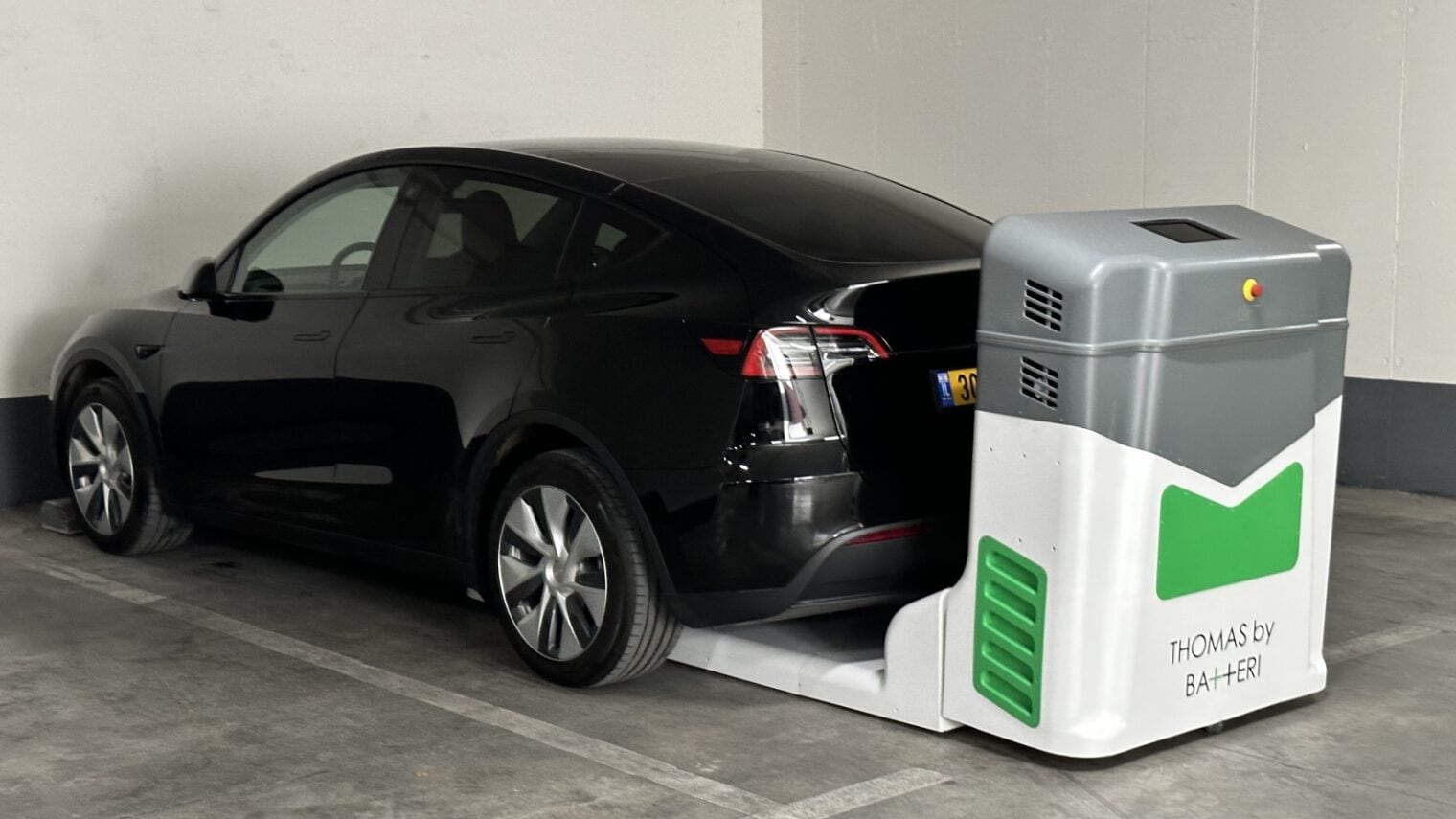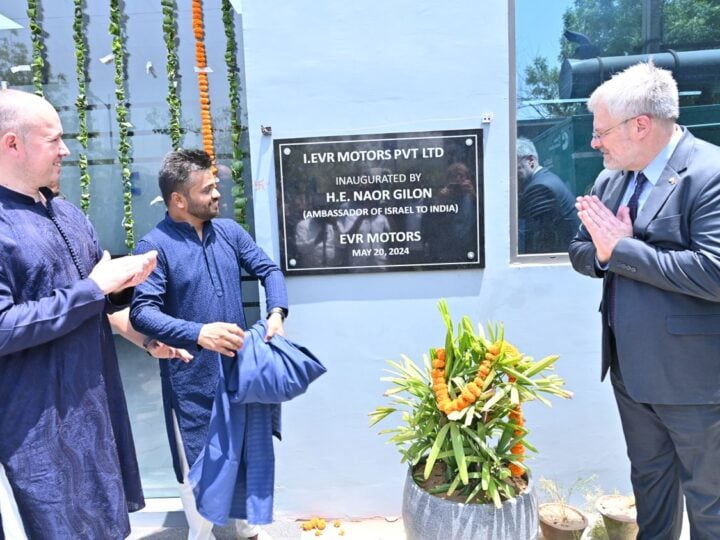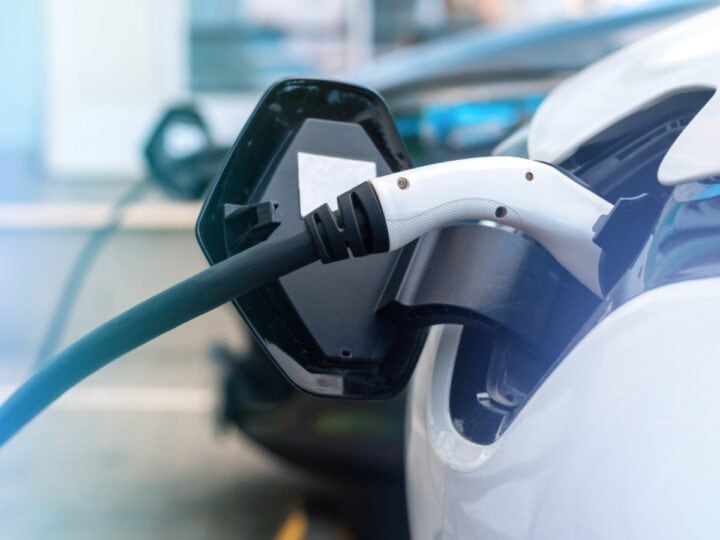In 2007, Israeli electric car infrastructure startup Better Place toyed with the idea of a robotic arm at its charging stations to plug a cable into the charger on one end and the car on the other, making the process less messy for drivers.
The team’s initial enthusiasm dimmed, however, as the cost for building such a sophisticated system soared and the idea was dropped.
Sixteen years later, another Israeli startup is again attempting to automate the charging process.
Tel Aviv-based BaTTeRi plans to set loose self-driving robots in parking lots – whether the space belongs to a hotel, a corporate fleet’s depot, a mall or an office building – that will approach your car, charge it, then move on to the next vehicle needing juice.
Introducing Thomas
BaTTeRi’s L-shaped robot is dubbed Thomas – an allusion to both electricity pioneer Thomas Edison and the children’s toy icon Thomas the Tank Engine, CEO Tomer Shahaf tells ISRAEL21c. Shahaf cofounded BaTTeRi with Ram Rotbart and Tamar Bezalel Burshtein.
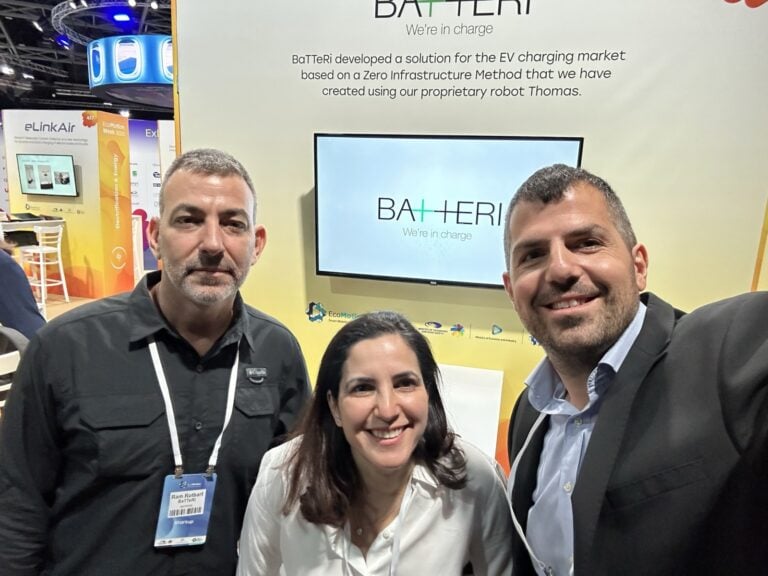
When users enter a Thomas-enabled parking lot, they’ll open an app to tell Thomas how long they’ll be there and how much charge will be required. Most people don’t need a full charge but just enough to get home, allowing Thomas to more quickly move on to the next car.
A single Thomas robot can charge 15 to 18 cars a day; larger lots could deploy multiple units. The robot’s own built-in battery can be charged traditionally or by renewables like solar power.
Thomas is designed to use AI – including sensors and cameras – to navigate the parking lot and find your car based on license-plate recognition.
Valet charging
If a vehicle has wireless charging technology, Thomas could just slide underneath and starts filling it with electrons.
But because only a few car manufacturers have thus far implemented wireless charging, and because BaTTeRi’s cofounders came to the same realization about building a robotic arm that Better Place’s execs did, Thomas needs a human operator to insert the cable. One operator could assist multiple Thomas robots.
“We call it ‘valet charging,’” Shahaf says. “If in the future a robotic arm makes sense, we’ll install it.”
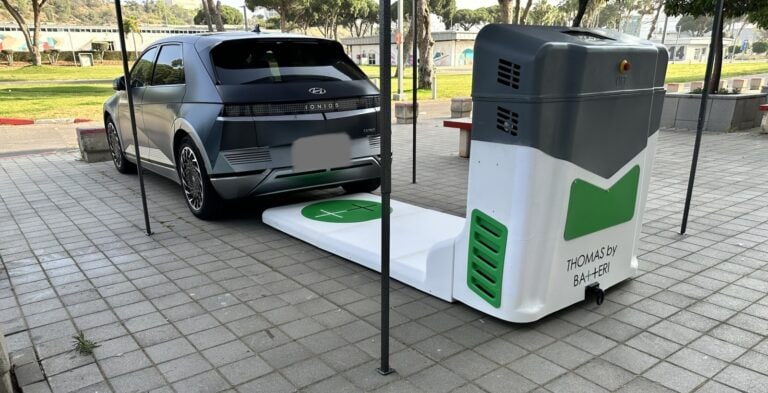
The good news, Shahaf adds, is that “because we’re not doing fixed infrastructure, retrofitting our robot to any new way to connect to charge the EV is very easy. We didn’t want to wait five years for wireless to be more widespread.”
Return on investment
BaTTeRi is focusing on corporate customers because this is where the ROI is the greatest.
Shahaf does the math.
“A car plugged in at an office building parking lot will only charge one to two hours a day. The rest of the time, the charger is occupied but can’t be used by another vehicle. A charger can cost up to $2,500 to install, so the return-on-investment for charging companies can be seven to 10 years. That’s a long ROI. As a result, parking lot owners don’t have interest in installing charge spots.”
For home charging – which Thomas doesn’t support for now but for the purpose of comparison – one would have to drive some 40,000 miles to make back the investment in a charger.
Parking lots that contain 50 cars or more, however, are ideal candidates for Thomas. ROI would be much faster despite the cost of purchasing the robots from BaTTeRi.
Shahaf said that Thomas “costs around the price of six to seven normal chargers but can charge up to 20 cars a day” and that most customers can achieve ROI in a year and a half.
Climate Solutions Prize
BaTTeRI was founded in 2022 and has raised a pre-seed round of $500,000. The startup has received awards and grants including one from the European Institute of Innovation and Technology.
Earlier this year, BaTTeRi was one of seven Israeli startups to win the Climate Solutions Prize, sponsored in part by Startup Nation Central.
Thomas is in the final stages of development with pilots being conducted in locations including Greece and Tel Aviv.
After participating in a “shark tank” competition, the Israel Electric Corporation agreed to buy several Thomas robots for its fleet of vehicles.
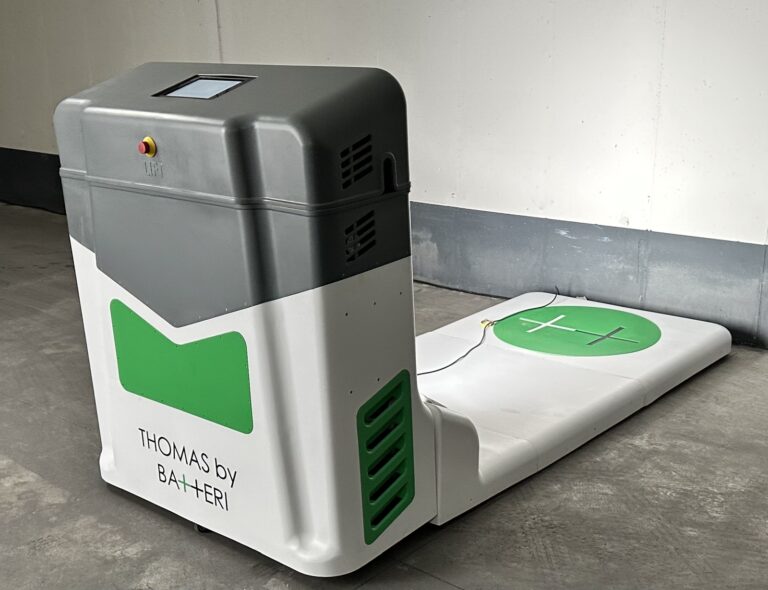
Israel has a long EV history punctuated by an even longer pause. Better Place was the only game in town from 2007 to 2013, when the company went bankrupt. Tesla only entered the market in 2021.
However, since then, less expensive Chinese EVs have flooded the market, and now some 16 percent of all new vehicle purchases in Israel are electric.
Around the world, around 26 million EVs were on the roads in 2022, according to the International Energy Agency, which predicts that by 2030, more than 60% of cars sold globally will be EVs.
More EVs
Finding a charge spot can be challenging. And finding one that isn’t broken – or that’s a fast DC voltage charger that can charge a battery to 80% in 45 minutes vs. a slow AC charger that takes overnight to fill up – isn’t easy either.
The situation is even more challenging in Israel and in Europe, where many people don’t have a dedicated parking spot at home. If they want to drive an EV, they must rely on a public charge spot.
Shahaf hopes his startup will enable more people to buy electric vehicles.
“People want them. But without home charging, people won’t buy an EV. Imagine if the nearest gas station was 100 miles away. Would you buy a petrol car?”
He is a big fan of EVs. “You can charge at home or at the office three times a week and you don’t ever need to visit a fuel station.”
Shahaf’s first EV was a Better Place Fluence Z.E., the company’s electric vehicle model in Israel. Then he purchased a Mitsubishi Outlander PHEV (plug-in hybrid electric vehicle) that got around 40 miles to the charge.
“I’d charge at home, but then I couldn’t find an electricity outlet at work; someone would be parked in front of it. So, I had a lot of range anxiety.”
Shahaf notes that, even today, some workers head to the office very early “to get there first in order to find a charger.”
Another use case for Thomas: the airport. “You leave your car there for three to four days. It needs charging before you return. But it would be crazy to install thousands of chargers in an airport lot when Thomas can work 24 hours a day to charge the vehicles.”
Your favorite Thomas
Is Thomas just a temporary solution? we asked Shahaf. After all, companies like Israeli startup StoreDot are promising batteries that can be fully charged in just five to 10 minutes. Wouldn’t that obviate the need for BaTTeRi’s solution?
Shahaf rejects the comparison. “If you had the ability to never have to go to a charge spot yourself, that would be preferable. You don’t want to stop for even five minutes.”
He also points out that fast charge requires a large amount of electrical power that may not be supported everywhere, especially in rural areas.
That said, the business case is not binary. On a long drive, battery swap or fast charge makes sense. After all, “you have to stop to go to the bathroom or get a cup of coffee,” Shahaf says.
So, who’s your favorite Thomas – Edison, Tank Engine or Israel’s latest battery juicer? Click here to find out more.




